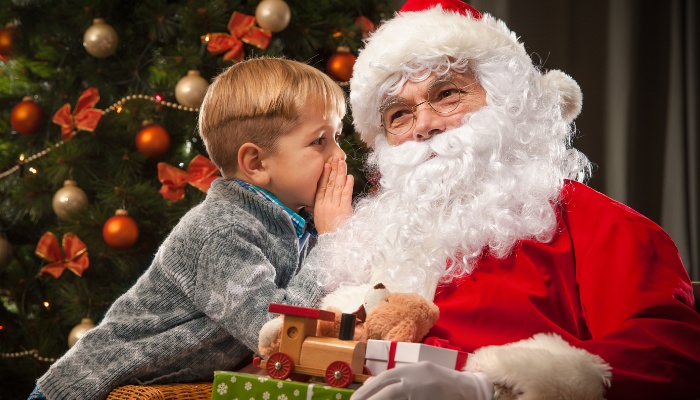The long-standing tradition of celebrating Santa Claus during Christmas has been observed for centuries.
Having changed and evolved into an even greater fantasy since its origin, the magic of Santa has become a very predominant part of the Christmas season.
While the Santa tradition is fun for both kids and their parents, there comes a time when believing comes to an end. When should children learn the truth about Santa?
Should an 11-year-old believe in Santa? The age at which a child learns the truth is different for every child. There is no “perfect” age to stop believing in Santa. Factors such as family traditions, cognitive development, and social environment all play a part in determining when a child is ready to learn the truth about St. Nick.
Determining when to tell your child the truth about Santa can be a difficult task.
We want to help you feel confident that you are doing the right thing for your child and give you some guidance on how to keep the Christmas magic alive even when the believing comes to an end.
Kids Believing in Santa
Santa Claus makes Christmas feel like such a magical time for a child.
Many adults reflect fondly on the magic they felt during the entire Christmas season and the beautiful childhood memories that came from their belief in Santa Claus.
Now, those adults are creating the same magic for their children.
However, questions definitely arise in parents’ minds as they consider how and when to tell their children the truth about Santa.
Average Age To Stop Believing in Santa
A 2019 survey conducted on over 4,500 households across the United States showed that the average age to stop believing in Santa was 8 years old.
How Old Is Too Old To Believe in Santa Claus?
This is a hard question to answer! Regarding the belief in Santa, pediatric psychologist Laura Lamminen says “It’s not an overnight shift in thinking… and there is no set age where children should know the truth about Santa Claus.”
The years between ages 7 and 11 mark a significant change in a child’s level of thinking.
They shift from being more imaginative to thinking more logically, which makes believing in Santa more difficult.
They will begin to question how reindeer fly, how Santa travels to every single house around the world in one night, and how he gets into households without chimneys.
It is likely that children will begin to figure out the truth about Santa Claus on their own or after hearing things at school.
As a parent, it will be important to watch for cues in your child’s behavior toward Santa Claus in order to know when they are ready to learn the truth.
Are they starting to get skeptical? Are the questions becoming more frequent?
If you notice these cues, it is likely time to start thinking about how you will tell them the truth about the man in the red suit.
Is 11 Too Old To Believe in Santa?
There is no “right” age to know the truth about Santa. However, it is very likely that your child will begin to doubt the existence of Santa by age 11 either because of his own logical thinking or from other kids at school.
12-Year-Old Still Believes in Santa
You may be concerned if you have or know a 12-year-old who still believes in Santa Claus.
Try not to worry too much about this as it does not indicate anything negative about your child’s development.
Some kids just take longer to figure out the truth, and that is okay. There is no “right” age to tell your kids the truth about Santa.
With that being said, as a former middle school teacher, I know that most middle schoolers have learned the truth about Santa, and I would be surprised if a 12-year-old has not heard talk of Santa from other kids at school.
Unfortunately, believing in Santa could cause social struggles for a middle school child.
Benefits of Believing in Santa
Imaginary and pretend play is an important part of a child’s development. Believing in Santa is similar as it creates an avenue for creativity and imagination.
Imagination and fantasy encourage kids to focus, think through hypothetical situations, strengthen their reasoning skills, develop theories about how people think, and create new possibilities.
Additionally, being able to believe without seeing is fundamental to human life even beyond the years of Santa Claus.
In addition to the developmental benefits, believing in Santa creates magical family traditions and childhood memories that children will carry with them throughout their lives.

Is Believing in Santa Harmful?
While the research on the benefits and risks of believing in Santa Claus is sparse, there seems to be more information pointing to the positive impacts that the Santa fantasy can have on a child’s development.
While some parents worry that their child will have negative experiences or issues trusting their parents after learning the truth about Santa, research shows that the opposite is actually more common.
The majority of children have a positive experience when learning the truth about Santa Claus.
How To Talk About Santa Without Lying
There are certainly ways to talk about Santa Claus without having to lie to your child.
First things first, stick to the facts! Tell them the story of St. Nicholas, and let history help you in this endeavor.
While creating the Santa fantasy for your children, you do not have to lie to them about all the “magical” things Santa does.
If they ask how he gets inside the house or if reindeer really fly, tell them that you genuinely do not know, but that there are a lot of “magical” guesses that people have.
When To Tell Kids About Santa
Parents can prepare to have the conversation about Santa anytime between the ages of 7 and 11 or when they begin to see signs that their child is ready to know the truth.
While there is no perfect age to have this conversation, it is generally best to wait for your child to ask you first.
If your child has not brought up the topic at all by the time they enter middle school, it may be a good time for you to initiate the conversation.
By this time, allowing them to continue to believe may begin to impact them socially as many of their peers will already know the truth.
Signs Your Child Is Ready To Know the Truth
Oftentimes, our children will give us signs or cues that will help us know they are ready to learn the truth.
- Questioning – As your child becomes more skeptical about Santa, they may begin to ask questions about him. Sometimes, they may cut to the chase and ask if he is real or not. Try to determine the source of the questions. Is your child beginning to figure things out on his own or is he trying to confirm rumors he is hearing at school? This will help you know how to address the topic.
- Change in Behavior – As children begin to question Santa, they may become less excited and may even become embarrassed about Santa Claus.
- Peer Group – Be aware of what is happening in your child’s peer group and what the “Santa Culture” is like in his circle and even among other children his age. If his peers know the truth or are beginning to question Santa, it is likely that your child is as well.
How To Tell Kids the Truth About Santa
Having the Santa conversation can often be difficult for both parents and their children.
Fortunately, with a little bit of preparation, parents can make the best of this difficult conversation and turn it into a memorable experience that can fuel future traditions and Christmas magic.
Here are a few tips and ideas that will make telling your kids the truth about Santa a special experience:
- Make it a special occasion. Take them out for hot chocolate or to do their favorite activity. Before beginning the conversation, make them feel important by emphasizing that they have proven themselves ready to learn the truth.
- Begin by asking them what they believe. Use their answers to guide your approach to the topic. A believing child may need a more sensitive conversation than a child who is already skeptical of Santa.
- Tell your child about the origin of Santa Claus and the story of St. Nicholas. Focus on the spirit of generosity that makes the holidays so special. Think of ways that your child can now become a part of that spirit too.
- Be sensitive to their emotions, and realize that change is hard. Ensure them that your family traditions will remain the same, and help them become a part of bigger and better traditions.
- Shift your child’s focus from believing in Santa to being a Santa. Encourage them to become excited about now being able to be a part of creating Christmas magic for others.
Related Questions:
Why Do Parents Lie About Santa?
Every year, parents must decide if they are going to commit to the Santa myth or attempt to survive without it in a culture that is deeply embedded in it.
Some parents are concerned that involving their children in the Santa story constitutes lying, which raises concern that their children will lose trust in them once they learn the truth.
The other perspective is that telling your children about Santa does not require lying at all. It is simply engaging them to participate in a fantasy.
These parents do not think that encouraging their children to believe in Santa is lying to them or being deceitful.
They think of it as a way to create magic and make Christmas time special for their little ones.
Both viewpoints are very valid, and every parent has good intentions. This concept has become quite controversial over the years, and ultimately, it is up to you to decide what is best for your family.
When Do Kids Stop Believing in the Tooth Fairy?
Most children will cease to believe in other fictional characters such as the Tooth Fairy and the Easter Bunny once they know the truth about Santa Claus.
Conclusion
Believing in Santa is a memorable experience for children all around the world, and the tradition looks different in every country and household.
Learning the truth about Santa is part of the tradition, but there are ways to make it special and keep the magic of St. Nick alive from generation to generation.
Charlynn is an educator and mom to fraternal boy/girl twins. She loves learning through the experiences she has with her littles and using her knowledge to help other moms as they embark on the journey of motherhood.

